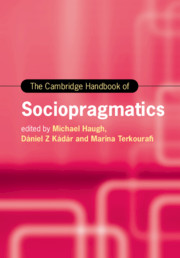Book contents
- The Cambridge Handbook of Sociopragmatics
- Cambridge Handbooks in Language and Linguistics
- The Cambridge Handbook of Sociopragmatics
- Copyright page
- Contents
- Figures
- Tables
- Contributors
- Acknowledgements
- 1 Introduction
- Part I Fundamentals of Sociopragmatics
- 2 Sociopragmatics
- 3 Inference and Implicature
- 4 Speaker Meaning, Commitment and Accountability
- 5 Social Actions
- 6 Stance and Evaluation
- 7 Reflexivity and Meta-awareness
- 8 Participation and Footing
- 9 Conventionalization and Conventions
- 10 Synchronic and Diachronic Pragmatic Variability
- 11 Activity Types and Genres
- 12 Social Groups and Relational Networks
- Part II Topics and Settings in Sociopragmatics
- Part III Approaches and Methods in Sociopragmatics
- Index
- References
9 - Conventionalization and Conventions
from Part I - Fundamentals of Sociopragmatics
Published online by Cambridge University Press: 01 April 2021
- The Cambridge Handbook of Sociopragmatics
- Cambridge Handbooks in Language and Linguistics
- The Cambridge Handbook of Sociopragmatics
- Copyright page
- Contents
- Figures
- Tables
- Contributors
- Acknowledgements
- 1 Introduction
- Part I Fundamentals of Sociopragmatics
- 2 Sociopragmatics
- 3 Inference and Implicature
- 4 Speaker Meaning, Commitment and Accountability
- 5 Social Actions
- 6 Stance and Evaluation
- 7 Reflexivity and Meta-awareness
- 8 Participation and Footing
- 9 Conventionalization and Conventions
- 10 Synchronic and Diachronic Pragmatic Variability
- 11 Activity Types and Genres
- 12 Social Groups and Relational Networks
- Part II Topics and Settings in Sociopragmatics
- Part III Approaches and Methods in Sociopragmatics
- Index
- References
Summary
In this chapter we explore the interrelated phenomena of conventionalization and conventions. We argue that the essence of convention is to facilitate meaning making in interaction, while conventionalization refers to the process through which conventions come into existence. We investigate the pragmatic complexity surrounding convention and conventionalization by arguing that (1) conventionalization is a matter of degree; (2) conventions and conventionalization are particularly prominent in intercultural interactions; and (3) language and socialisation are highly relevant to conventionalization. We also investigate facets of language use with complex implications for convention and practice, and we provide various interactional examples to illustrate these facets.
Information
- Type
- Chapter
- Information
- The Cambridge Handbook of Sociopragmatics , pp. 162 - 181Publisher: Cambridge University PressPrint publication year: 2021
References
Accessibility standard: Unknown
Why this information is here
This section outlines the accessibility features of this content - including support for screen readers, full keyboard navigation and high-contrast display options. This may not be relevant for you.Accessibility Information
- 1
- Cited by
